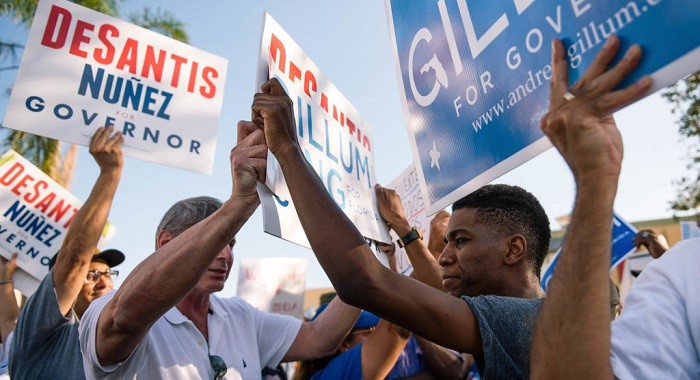- Article
- American Politics
America’s Midterm Elections: A Mixed Picture for Trump and the Democrats
November 19, 2018

While conventional wisdom has suggested that America’s 2018 midterm elections were a defeat for President Donald Trump and congressional Republicans, reality seems more complex.
While the Democratic Party has taken control of the House of Representatives, which will have significant consequences during the second half of Trump’s term, they did not win a crushing victory. Democrats did not win control of the Senate; indeed, they lost seats. One conservative commentator has observed that Democrats lost many more seats in the 1994 or 2010 midterms—54 in the former case and 63 in the latter, compared to 34 now. Democrats gave up several Senate seats in each of those elections as well, while Republicans gained at least one in the 2018 voting. [https://nationalinterest.org/feature/trump-won-midterms-heres-why-35417]
Trump May Not Have Won, But He Didn’t Lose Either
Perhaps more important, however, is that the midterm elections energized both sides, something that was evident in record-breaking voter turnout. [http://time.com/5452258/midterm-elections-turnout/] Trump’s ability to mobilize Republican voters means that no Democrat can take victory in 2020 for granted—something that many have done for the last two years. The inescapable conclusion is that Donald Trump can plausibly win reelection.
More important, he has convincingly demonstrated that his election in 2016 was not a fluke but instead the result of his understanding and exploitation of important underlying realities in American politics. The conservative commentator cited above compared the 2018 midterms to the 1970 midterms, when Republicans similarly lost House seats and gained Senate seats. Notwithstanding controversy and considerable anger among liberal Democrats, after that election, Nixon went on to win reelection in 1972.
While both Republicans and Democrats are still assessing election outcomes and developing strategies for the new Congress, they will do so in the context of what each side is likely to frame (again) as a looming titanic war over the fate of the nation. The first battles in that war will begin in January, when newly-elected Senators and Representatives take their seats. Statements by leading Democrats foreshadow a systematic assault on the Trump administration and its policies, with Democratic-controlled House committees leading the way through hearings and investigations of the president’s most controversial actions [https://www.washingtonpost.com/politics/democrats-signal-aggressive-investigations-of-trump-while-resisting-impeachment-calls/2018/11/11/63945180-e5d4-11e8-bbdb-72fdbf9d4fed_story.html?utm_term=.5fbf4c752786].
What Will the Democrats Do?
However, the Democrats’ attacks on Trump appear less likely to concentrate on Russian interference in the 2016 election, allegations of collusion between the Trump campaign and Russian officials, and other campaign-related charges. Considering the time and effort Democrats have previously devoted to these issues, it may seem remarkable how little attention they received as 2018 campaign issues.
In practice, however, Trump has successfully persuaded most Republicans that these are overwhelmingly partisan attacks even as two years of his policies have persuaded most Democrats that his other actions—whether related to immigration, health care, judicial appointments, or other matters—pose greater dangers to their political priorities. The proof is in a recent poll by the Pew Research Center, which found that “collusion with Russia” motivated only 5% of those who dislike Trump. [http://www.people-press.org/2018/08/23/trump-has-met-the-publics-modest-expectations-for-his-presidency/] Voters are more worried about other things.
The fact that Republican gains in the Senate make Trump’s impeachment even less likely—barring bombshell disclosures of serious and demonstrable illegality from Special Counsel Robert Mueller’s investigation—adds even more pressure on Democrats to turn their attention away from Russia and toward important domestic political issues. Since political power is inherently a limited commodity, Democrats have a strong incentive to invest it in battles that can produce measurable outcomes for their voters. To be sure, the House Select Committee on Intelligence seems likely to continue its investigation of the 2016 campaign—but this effort seems equally unlikely to take center stage for Congressional Democrats.
The War for America
Looking ahead to 2020, the greatest danger in the rapidly approaching two-year war for America that each party seems to promise may well be in how Republican and Democratic political leaders define the stakes. Over the last 20 years, America’s political fights have moved away from disagreements over better or worse policies and toward contests between right and wrong if not good and evil. The latter not only make compromise impossible but also justify increasingly outrageous conduct by politicians, journalists, and ordinary citizens. The other side’s inability to compromise, and its hostile behavior, only further raise the stakes for both Democrats and Republicans. The result is an uncontrollable political escalation spiral.
In conflicts between states, uncontrolled escalation leads to war. In conflicts within states, escalation can likewise lead to violence. When looking back at the events of the last few years, ranging from a 2017 shooting at a House Republican baseball game to a more recent mail-bomb scare campaign targeting prominent Democrats, it is all too easy to imagine protests or other politically motivated activity leading to accidental or deliberate killings connected to America’s 2020 presidential election.
In fact, 2018 may be setting the stage for a return to 1968, a year of violent demonstrations, mass arrests, and the assassinations of Reverend Martin Luther King, Jr. and presidential candidate Robert F. Kennedy. While America survived 1968, and years of subsequent turmoil, few should wish to repeat the experience.
